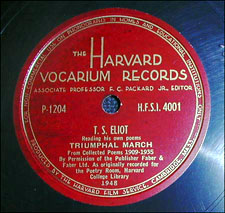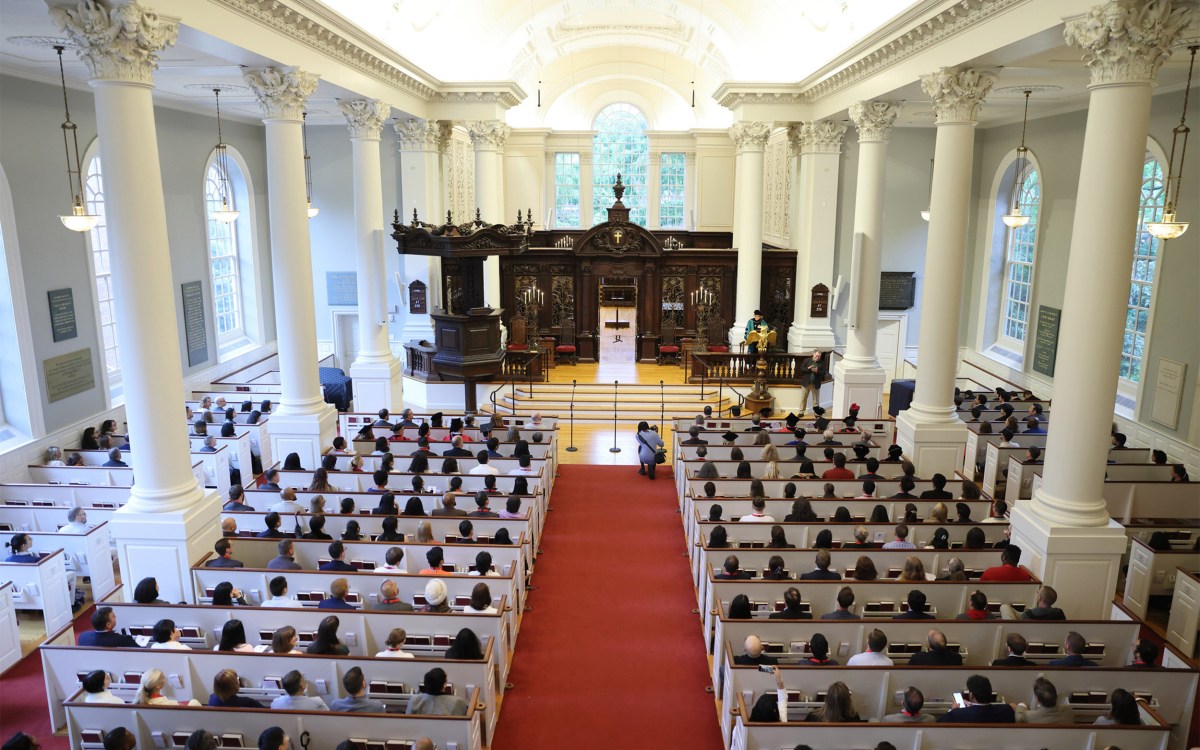Harvard vocarium picked for National Recording Registry

Librarian of Congress James H. Billington has announced that the Harvard Vocarium is included in the first annual selection of 50 recordings that will be placed in the National Recording Registry.
In making the announcement of the registry, Billington stated, “The challenge of reviewing more than 100 years of the history of recorded sound in America and selecting only 50 significant recordings for the inaugural recording registry was formidable. The registry was not intended by Congress to be another Grammy Awards or ‘best of’ list. Rather, Congress created the registry to celebrate the richness and variety of our audio legacy and to underscore our responsibility to assure the long-term preservation of that legacy so that it may be appreciated and studied by generations to come.”
In the 1930s, recording pioneer Frederick C. Packard – in collaboration with Harvard’s Poetry Room, the Harvard Film Service, and the Department of English – launched the Harvard Vocarium label and began producing audio recordings of authors reading their own works. First to record was T.S. Eliot reading “Gerontion” and “The Hollow Men.” The collection, which was to be used for the “appreciation of literature,” grew to include unique recordings of dozens of poets and writers including Tennessee Williams, W.H. Auden, Robinson Jeffers, Marianne Moore, Archibald MacLeish, Theodore Roethke, Muriel Rukeyser, and Robert Lowell, and is in continuous use by students and researchers.
Nobel laureate Seamus Heaney, supporting the need to preserve the Harvard Vocarium recordings, wrote, “The Harvard collection is indispensable: it contains not only the voices – from different times of their lives – of the greatest poets of the last century … but constitutes a living history of modern poetry.”
William P. Stoneman, Florence Fearrington Librarian of Houghton Library, noted, “The Harvard Vocarium poetry recordings are an important resource in our study of modern American poetry and we are pleased that they have been recognized in the first annual selection of the National Recording Registry by the Library of Congress. The George Edward Woodberry Poetry Room has almost 60 years of similar recordings and we recognize our obligation to preserve them for scholarly research and to provide access to them for inspiration and enjoyment. We must also remember that these recordings of poets reading their work are a part of Harvard University’s larger collection of audio and video materials that record our national achievements in theater, music, and the history of arts and the sciences.”
Other inaugural selections to the National Recording Registry include the first recording of John Philip Sousa’s “The Stars and Stripes Forever,” Scott Joplin’s piano roll rags, FDR’s “Fireside Chats,” the crash of the Hindenberg, Bing Crosby singing “White Christmas,” Elvis Presley, Enrico Caruso, Gershwin, “Casey at the Bat,” Bessie Smith, Woodie Guthrie, Abbott and Costello’s “Who’s on First,” Martin Luther King’s “I Have a Dream,” and Kate Smith’s “God Bless America,” Bob Dylan and Aretha Franklin. Bela Bartok, Igor Stravinsky, Tito Puente, Les Paul and Mary Ford, Orson Welles’ “War of the Worlds,” Billie Holiday, Duke Ellington, and rapster Grandmaster Flash and the Furious Five are also included.
Donald Share, curator of the George Edward Woodberry Poetry Room, said, “We are now in the process of gathering together all of the amazing artifacts of the Vocarium legacy: the extremely rare test pressings and outtakes, the correspondence between the writers Packard recorded and the Poetry Room, and even the original metal stampers for producing the disks. By assembling all of this material, we hope to be able to produce the best possible versions of the recordings. In addition, we bring to light items which have never before been accessible.”




